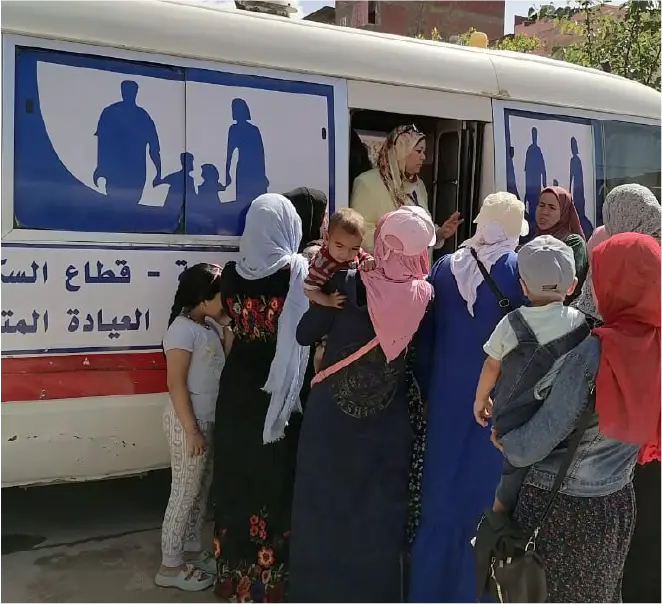OUR SERVICES
Welcome to our platform where we discuss vital interventions in the
family planning and reproductive health sector. Here, we focus on
providing accessible services, improving quality, ensuring the availability
of contraceptives, enhancing partnerships, and implementing effective
community marketing strategies.
1. Accessibility of Family Planning and Reproductive Health Services

Objective
To make family planning and reproductive health services available everywhere across the country
Mobile and Fixed Units:
- 5431 comprehensive fixed units including family health and development units.
- 582 mobile clinics.
- 479 family planning clinics run by NGOs.
Programs and Campaigns:
- Door-to-door campaigns and awareness drives.
- Service activation campaigns and reproductive health caravans.
- Visiting doctor programs and contracting with physicians to provide services.
Postnatal Family Planning:
- Implementation of postnatal and post-abortion family planning services
especially intrauterine device (IUD) insertions after cesarean deliveries to avoid
unintended pregnancies.
- Implementation of postnatal and post-abortion family planning services
especially intrauterine device (IUD) insertions after cesarean deliveries to avoid
unintended pregnancies.

2. Ensuring Availability of Contraceptives
Objective
To ensure continuous availability of a variety of modern contraceptive methods.
Contraceptive Methods:
-
Oral pills (two types), injectable contraceptives (two types), copper IUDs, male condoms,
subdermal implants, topical pills, and emergency contraceptive pills.
- Introduction of new options such as hormonal IUDs and Multiload IUDs.
- Introduction of self-injectables (SAYANA) to diversify contraceptive options.
-
Oral pills (two types), injectable contraceptives (two types), copper IUDs, male condoms,
subdermal implants, topical pills, and emergency contraceptive pills.
3. Quality Improvement
Objective
To enhance the quality of family planning and reproductive health services.
Recognition and Training:
-
Clinics awarded the "Excellence Emblem" for outstanding service.
-
Training programs for service providers (doctors and nurses).
- Enhancing the skills of community marketing teams (media officers, rural pioneers, women’s club supervisors).
-
Clinics awarded the "Excellence Emblem" for outstanding service.

Digital Systems:
- Development of electronic systems for beneficiaries and supply chain management (LMIS-HMIS).
-
Integration of all family services data for the national family development project.
Service Standards:
- Updated service delivery standards.
- Training of supervisory teams.

4. Community Marketing
Objective
To increase awareness and usage of family planning services through social
marketing.
Media and Outreach:
-
Facebook page "حقك تعرفي لتنظيم الأسرة "with 38,444 followers and 1,830,000 views.
-
Television ads featuring famous Egyptian personalities and various radio dramas
focusing on family planning and reproductive health.
-
Facebook page "حقك تعرفي لتنظيم الأسرة "with 38,444 followers and 1,830,000 views.
Behavioral Change Communication (SBCC):
-
Social media training.
- House visits and informational seminars.
- Distribution of IEC (Information, Education, Communication) materials.
-
Social media training.
Women's Clubs:
- Development of women’s clubs in health units to educate women on family planning while providing skills training in handicrafts and other trades to improve economic status.
5. Partnerships with Other Entities
Objective
To strengthen cooperation with various entities for enhanced service delivery.
Governmental and Non-Governmental Partners:
- Ministries (Higher Education, Endowments, Social Solidarity, etc.), NGOs, and international organizations (USAID, World Bank, WHO, etc.).

Development Projects:
-
Collaborations aimed at holistic family development and improved
service accessibility across all regions.
-
Collaborations aimed at holistic family development and improved
service accessibility across all regions.